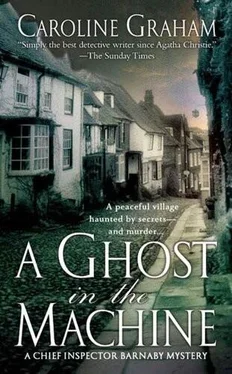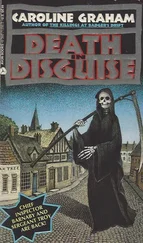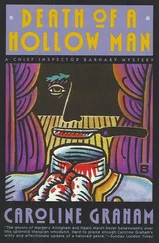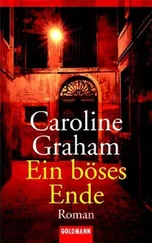Polly pushed open the door on the left and found herself in a kitchen. She didn’t linger – what would be the point? A kitchen was a kitchen. But she did notice that everything looked pretty shabby. The cupboards had been recently painted, rather clumsily. All this was a bit depressing and Polly frowned as she stepped back into the hall. Seediness seemed to her even more unattractive than outright poverty. At least poverty was in your face and minus that awful creeping pseudo-gentility that came with keeping up appearances. That was simply pathetic. In fact, Polly decided, given the right circumstances, poverty could be quite an advantage. After all, didn’t everyone crave simplicity these days? You couldn’t open a magazine without seeing some C-list celeb clad in artfully tattered rags, squatting on an African birthing stool in a stripped-down loft in Clerkenwell.
Momentarily diverted from just how near she herself presently was to out-and-out poverty, Polly pushed open the second door and, this time, entered a small, extremely cluttered sitting room.
Though there were masses of books on sagging shelves there were also several wide empty spaces. Once-beautiful wallpaper (yellow and ivory toile de Jouy) was now faded, even slightly torn in one or two places. There was a darker rectangle in one corner, from the floor almost to the ceiling where for years something must have been standing. Polly, guessing at a grandfather clock, then noticed other different sized patches on the walls where presumably paintings had once hung. In the centre of the ceiling, from which depended a single light with a plain linen shade, were several holes, the Rawlplugs still inside. Polly wondered what sort of light had been replaced and guessed at a chandelier. Finally a large glass and walnut cabinet held just three pieces – a silver salt dish lined with dark blue glass and an exquisite shepherd and shepherdess in Watteauesque costumes.
On the top of the cabinet was a large coloured photograph of Ashley and Judith. They were on a boat, leaning over the side, laughing into the wind. Their hair was all blown about and Judith’s cardigan, its sleeves knotted loosely around her neck, was flying up and out behind her like a sail. She was staring fixedly, devouringly even, at Ashley who was gazing out of the picture at the far horizon.
Polly, not easily impressed, caught her breath at the sight of him. At the vivid brilliance of his smile; at the golden brown glowing skin and muscular shoulders. What a contrast to his companion. Coarse black hair, a thick neck and a complexion so dark and muddy Polly felt she could, in all honesty, describe it as swarthy. Plus the woman was extremely short, barely up to Ashley’s chest. Dwarfish, to be precise. So engrossed was Polly in enjoyable contemplation of Judith Parnell’s squat sturdiness that her heart almost stopped at a sudden clatter directly behind her. Jumping round, she all but fell over. No one was there.
Then she realised the sound came from a fax machine in the final room, only fractionally bigger than a dog kennel, underneath the stairs. Polly took a step or two inside – three would really have been stretching it – and gazed about her. A small-screen monitor, a computer, disk drive and keyboard on what looked like a card table. An elderly Epson printer, a mug of pens and the Financial Times. The phone, answering and fax machines were on a broad window ledge.
She wondered if Ashley might be in bed. Asleep presumably or he would surely have responded when she had called out. So that was that. There was no way Polly was going upstairs. That would be clumsy in the extreme. Positively crass. The game here was flirtation, casual and light-hearted. She was wooing Ashley, not hunting him down.
But then, stepping back out on to a cinder path, she saw him at the far end of the garden, inside a fruit cage. He had a white china bowl in the crook of his arm and was picking raspberries.
The force of Polly’s immediate reaction truly shocked her. Dry throat, quickened heartbeat, nausea. These were not familiar sensations and she was deeply uneasy when they occurred. Almost afraid. She hesitated. Nothing had happened so far. She could walk away now – walk down the path, through the wrought-iron gates, across the road to Appleby House and never look back. Ending something before it began and still in control. That would be the sensible thing to do.
But Polly, who had always had everything she ever wanted, was ill-equipped for sensibleness, let alone self-sacrifice. The nausea passed, an upsurge of excitement took its place and she was just about to make her way towards the vegetable garden when she noticed a movement. Near the ground, between the first two rows of canes, there was a large circle of blue and white stripes, which suddenly shifted, revealing itself to be the rear end of Benny Frayle.
Back at Appleby House Polly felt no gratitude that what might well prove to be an acutely wise decision had been taken by the Fates on her behalf. Instead she felt furious with Benny. What on earth had the woman been doing over there, monopolising Ashley? It wasn’t as if they could have anything in common. Benny had nothing in common with anyone as far as Polly could see, except perhaps one of those stumbling stammering overweight losers who turned up regularly on television quiz shows, barely able to answer the simplest question and present only as an object of ridicule.
But by the time Benny returned with a huge amount of delicious raspberries Polly’s mood had softened. After all, there was no special hurry. Wasn’t hope deferred supposed to make the heart glad? The recollection was admittedly vague. Her mother had given her a diary one year with a quotation on every page from Shakespeare or the Bible or some famous novel or other. Tried to explain the beauty of the words and their context, hoping to lead Polly towards literature, to broaden her mind. Had even suggested she give figures a rest for a while. Fat chance. What had literature ever done for Polly’s mother? Twenty-five years in the business and still only picking up peanuts. Polly had met jobbers and brokers, some hardly older than herself, earning as much in a month.
But then, not too long after this, when Benny was cutting some white bread and butter to go with the kippers (kippers!) for supper, Polly, previously fretting at the slowness of time passing, realised what an excellent opportunity had suddenly presented itself. No point in questioning her mother about the Parnells. Look how suspicious and snappy she’d been when Polly had merely suggested asking them around for a drink. But Benny, who had known the couple for as long as they’d lived in Forbes Abbot, Benny would not be suspicious. And she loved to talk. All Polly would have to say was something along the lines of: “How kind of Ashley to give you all these lovely raspberries, Ben. I must say they do seem to be awfully nice people.” So Polly tried exactly this, with immediate success.
“Oh – but he’s always bringing salads and vegetables over for us, dear,” replied Benny. “Judith too. They are so kind.”
As the evening wore on Polly discovered more and more about the kindness and niceness of Benny’s nearest neighbours. About how they always looked after Croydon and took in post and watched out for burglars when Ben and Carey had gone away. How, when Carey became seriously ill. Judith had driven into Causton to collect her prescriptions even though she had her own work and Ashley to care for. Poor Ashley, ill for months now and no one seemed able to find out what it was. Judith had tried everything under the sun, such expense. And she worked so hard.
When there was a bit too much of Judith, which honestly meant any mention longer than a couple of seconds, Polly skilfully directed the babbling stream back towards Ashley.
Читать дальше










